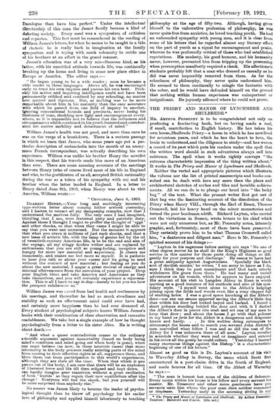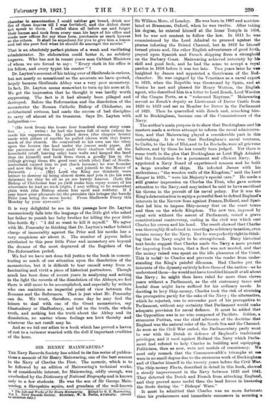THE PRIORY AND MAN OR OF LYNOHMEHE AND SHULBREDE.*
MR. ARTHUR PONSONBY is to bo congratulated not only on producing a fascinating book, but on having made a real, if small, contribution to English history. . He has taken his
own house, Shulbrede Priory—a house in which he has now lived for seventeen years, and which -he has the heart to love, the brain to understand,and the diligence to study—and has woven a record of its past -which puts his readers under the spell that the written word should in such adventures always call into existence. The spell when it works rightly conveys " the
extreme characteristic impression of the thing written about." It workain The' Priory and Manor of Lynehmere and Shabred,e.
Neither the varied and appropriate pictures which illustrate the volume nor the list of, printednianuscripts and books con- sulted can be _ dealt.-with. here any more than the plans and architectural sketches of arches and tiles and heraldic achieve- ments. All we can do is to -plunge our -hand into " the lucky bag " of the -text. What -the present writer first got out of that bag was the -fascinating .account of the diesolution of the Priory when Trenry VIII.,-through the Earl of Essex, Thomas Cromwell, laid .his heavy hand on the minor monasteries and turned the poor beadsmen adrift. Richard Layton, who carried
out the visitations in Sussex, wrote letters to his chief which were not only numerous but,-as Mr. Ponsonby notes, intensely graphic, and, fortunately; most of these have been preserved.
They certainly prove him to be what Thomas Cromwell called him, " a dexterous and diligent man." Here is Mr. Ponsonby's spirited account of -his doings :-
" Layton in his eagerness before vetting out says No one of what degree soever he be shall do the King's Highness so good service in this matter for those parts doing all things so dill. gently for your purpose and discharge.' He seems to have had a great antipathy against Augustinian. Specially the black sort of devilish monks,' he writes, ' I am sorry to know as I do, sure I think they be past amendment and God bath utterly withdrawn His grace from them.' He had many and varied adventures on his rounds, which he appears to have enjoyed. His account of his visit to Langden Abbey in Kent is worth quoting as a good instance of his methods and also of his-epis- tolary. style. 'I myself went alone to the Abbot's lodgings joining upon the fields and woods even like a cony clapper full of starting holes. I was a good space knocking at the Abbot's door--nee vox nee senaue apparuit saving the Abbot's -little dog that within his door fast locked -bayed and barked. I found a short poleaxe standing behind the door and with it I dashed the Abbot's door in pieces ictu -oculi and set one -of -my men to keep that door : and. about the house I go-with that poleaxe in my hand no- forte for the Abbot is a dangerous and desperate knave and hardy. . . In • this sudden -doing extempore to oircumsept the house and to search yon servant John Antony's men marvelled what fellow I was and eo did the rest of the Abbey for I was unknown there of all men.' Layton revelled
in scandals whether they were real or and entered in his notes all the gossip he could collect. ' Yesterday I learned many enormous things against the Bishop ' is a characteristic beginning of one of his letters."
Almost as good as this is Dr. Layton's account of his visit to Waverley Abbey in Surrey, the name which Scott first
encountered in a post-chaise drive in the South of England,
and made famous for all time. Of the Abbot of Waverley he says :- " The man is honest. but -none of the children of Solomon. Every monk within his house is his fellow and every servant his master. Mr. Treasurer and other more gentlemen have put servants unto him whom the poor man Aare neither command or displease. Yesterday early in the morning sitting .in my • he Priory and Manor of Lynehmere and Sheared& By. Arthur Pawn)* Taunton: Bandcott and Pewee. [218. net.] chamber in examination I could neither get bread, drink nor fire of these knaves till I was fretished, and the Abbot duvet not speak to them. I called them all before me and forgot their names and took from every man his keys of his office and made new offices for my time here, perchance as stark knaves as the others. It shall be expedient for you to give him a lesson and tell the poor fool what he should do amongst the monks."
That is an absolutely perfect picture of a weak and vacillating administrator. No elaboration could better it, no subtlety improve. Who has not in recent years seen Cabinet Ministers of whom we are forced to say : " Every clerk in his office is his fellow, and every typist his master " Dr. Layton's account of his taking over of Shulbrede is curious, but not nearly so sensational as the accounts, we have quoted, largely because Shnlbrede Abbey was a very poor monastery. In fact, Dr. Layton seems somewhat to turn up-his nose at it. We get the impression that he thought it was hardly worth suppressing. The fact is it had already been pillaged and destroyed. Before the -Reformation and the dissolution of the monasteries the Roman Catholic Bishop of Chichester, an
architectural virtuoso, had made the excuse of bad discipline to carry off almost all its treasures. Says Dr. Layton with
indignation :-
" (He took from) the house four hundred sheep sixty oxen five . . . swine : he had the barns full of corn (when) he made his suppression. He pulled down (the chapter house) made with pillars of marble he pulled (down with the) fratre much of the church. He con(verted to his own use the tiles) upon the houses the lead under the (eaves and) pipes. All the pavement of the fratr(e and) their chalices with all the household (stuff, leaving only) bare walls and keeped the land thus (to himself) and took from. them a goodly Inn in the (village giving) them 408. good rent which (the) Earl of North- umberland caused him to put (back because) he was founder and now the King is for . . . and joineth to the Manor of Petworth . . . (My) Lord the King me thinketh were be(tter to destroy it) being almost down and join it (to his own demesne) for they be all as ye see bawdy knaves. (Let) the Bishop of Chichester fear. ye (will make him repay some) of his whereunto he had no such (right, I am) willing to be somewhat plain with (the Bishop about his) spoil aad robbery. If I may know your Measure in) the premises this bringer the bawdy Prior (can bring the same back). From Sheibrede Priory this Monday by your s(ervant)."
It is very delightful to see in this passage how Dr. Layton unconsciously falls into the language of the little girl who asked her father to punish her baby brother for killing the poor little blue-bottle fly : " I did so want to kill it myself." We agree with Mr. Ponsonby in thinking that Dr. Layton's rather belated charge of immorality against the Prior and his monks has a very suspicious air about it. The number of joyous ladies attributed to this poor little Prior and monastery are beyond the dreams of the most depraved of the Regulars of the Pre-Reformation period.
We feel we have not done full justice to the book in concen- trating so much of our attention upon the dissolution of the
monasteries, but it is difficult to tear oneself away from so fascinating and vivid a piece of historical portraiture. Though much has been done of recent years in analyzing and setting in the light the records of the dissolution of the Abbeys, we feel there is still more to be accomplished, and-especially by writers who can maintain an impartial point of view between the Romans and the Reformers. That is just what Mr. Ponsonby can do. We trust, therefore, some day he may find the leisure to deal with one of the Great monasteries, say Glastonbury or Shaftesbury, and tell us the truth, the whole truth, and nothing but the truth about the Abbey and its dissolution, no matter whose feelings are hurt thereby and whatever the net result may be.
And so we bid our adieu to a book which has proved a haven of rest to a reviewer wearied with the dull if important crudities of the hour.



































 Previous page
Previous page